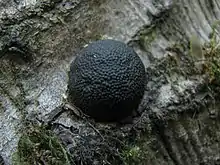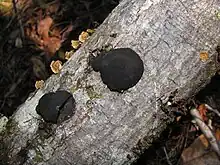| Annulohypoxylon | |
|---|---|
 | |
| Annulohypoxylon thouarsianum | |
| Scientific classification | |
| Kingdom: | |
| Division: | |
| Class: | |
| Order: | |
| Family: | |
| Genus: | Annulohypoxylon Y.-M.Ju, J.D.Rogers & H.-M.Hsieh (2005) |
| Type species | |
| Annulohypoxylon truncatum (Schwein.) Y.M.Ju (2005) | |
Annulohypoxylon, sometimes called cramp balls,[1] is a genus of fungi in the family Xylariaceae.[2] The 27 species in the genus have a collectively widespread distribution.[3]
The genus Annulohypoxylon was created in 2005 and contains species formerly placed in the closely related genus Hypoxylon (it is equivalent to Hypoxylon section Annulata sensu).[4] Fossils of Annulohypoxylon have been found in 12 million year old rocks from central England.[5]
Use in the cultivation of Tremella fuciformis
Species in the genus Annulohypoxylon, especially Annulohypoxylon archeri, are commonly used in the cultivation of Tremella fuciformis, one of the foremost medicinal and culinary fungi of China and Taiwan.[6]
Tremella fuciformis is a parasitic yeast that does not form an edible fruit body without parasitizing another fungus. The species Annulohypoxylon archeri is its preferred host, so cultivators usually pair cultures of Tremella fuciformis with this species, or others in the former genus Hypoxylon[6] (now split into two genera – Hypoxylon and Annulohypoxylon).[4]
Species
- A. annulatum
- A. apiahynu
- A. archeri
- A. atroroseum
- A. austrobahiense
- A. bahnphadengense
- A. bovei
- A. cohaerens
- A. discophorum
- A. elevatidiscum
- A. gombakense
- A. hemicarpum
- A. hians
- A. ilanense
- A. leptascum
- A. leucadendri
- A. macrodiscum
- A. maeteangense
- A. michelianum
- A. microcarpum
- A. minutellum
- A. moriforme
- A. multiforme
- A. nitens
- A. nothofagi
- A. orientale
- A. pouceanum
- A. pseudostipitatum
- A. purpureonitens
- A. purpureopigmentum
- A. pyriforme
- A. squamulosum
- A. stygium
- A. subeffusum
- A. thouarsianum
- A. truncatum
- A. urceolatum
Gallery


 Annulohypoxylon cohaerens
Annulohypoxylon cohaerens Annulohypoxylon cohaerens
Annulohypoxylon cohaerens Annulohypoxylon cohaerens
Annulohypoxylon cohaerens Annulohypoxylon multiforme
Annulohypoxylon multiforme Annulohypoxylon multiforme
Annulohypoxylon multiforme Annulohypoxylon multiforme
Annulohypoxylon multiforme Annulohypoxylon multiforme by James Sowerby (1803)
Annulohypoxylon multiforme by James Sowerby (1803)
References
- ↑ "Cramp Balls (Annulohypoxylon thouarsianum)". iNaturalist. Retrieved 2020-11-13.
- ↑ Lumbsch TH, Huhndorf SM (December 2007). "Outline of Ascomycota – 2007". Myconet. Chicago, USA: The Field Museum, Department of Botany. 13: 1–58. Archived from the original on 2009-03-18.
- ↑ Kirk PM, Cannon PF, Minter DW, Stalpers JA (2008). Dictionary of the Fungi (10th ed.). Wallingford,UK: CAB International. p. 38. ISBN 978-0-85199-826-8.
- 1 2 Hsieh HM, Ju YM, Rogers JD (2005). "Molecular phylogeny of Hypoxylon and closely related genera". Mycologia. 97 (4): 844–865. doi:10.3852/mycologia.97.4.844. PMID 16457354.
- ↑ Pound, Matthew J.; Nuñez Otaño, Noelia B.; Romero, Ingrid C.; Lim, Michael; Riding, James B.; O’Keefe, Jennifer M. K. (2022). "The fungal ecology of the Brassington Formation (Middle Miocene) of Derbyshire, United Kingdom, and a new method for palaeoclimate reconstruction". Frontiers in Ecology and Evolution. 10. doi:10.3389/fevo.2022.947623. ISSN 2296-701X.
- 1 2 Stamets P. (2000). "Chapter 21: Growth Parameters for Gourmet and Medicinal Mushroom Species". Growing gourmet and medicinal mushrooms = [Shokuyo oyobi yakuyo kinoko no sabai] (3rd ed.). Berkeley, California, USA: Ten Speed Press. pp. 402–405. ISBN 978-1-58008-175-7.